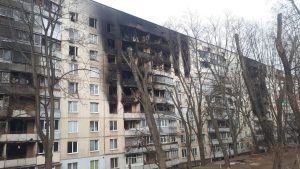2022 – The year that was
2022 has been a tumultuous year, dominated by the war in Ukraine and the massive human, economic and political chaos it has generated.
The war has killed tens of thousands of people and created Europe’s largest refugee crisis since WWII with an estimated eight million Ukrainians displaced within their homeland and 7.8 million fleeing the country.
Elsewhere around the world, Ethiopia’s civil war finally ended, the Taliban tightened its grip in control of Afghanistan, Iran saw an up swell of protests over human rights abuses and the civil war in Yemen ground on.
A peace deal signed in November has brought hope for an end to the world’s deadliest conflict in Ethiopia.
After two years of war and hundreds of thousands of deaths, a ceasefire arrangement was struck on November 2 between Ethiopia’s federal government and their rivals in the northern Tigray region. The Taliban recently announced that women would be barred from tertiary education in Afghanistan.
The Taliban recently announced that women would be barred from tertiary education in Afghanistan.
Despite promises to the contrary, human rights and women’s rights have been wound back and the country has been plunged into a humanitarian crisis.
The Afghan economy has collapsed, mainly because international governments have stopped foreign aid and restricted financial transactions.
More than 90 per cent of Afghans have been food insecure for almost a year, causing millions of children to suffer from acute malnutrition and threatening serious long-term health problems.
In Iran, thousands of protestors have been detained and hundreds killed in a brutal crackdown by Iranian authorities.
“Iranian authorities have ruthlessly cracked down on widespread anti-government protests with excessive and lethal force throughout the country,” a Human Rights Watch report said.
The protests began on September 16 after the death of Kurdish woman Mahsa Amini’s in the custody of Iran’s ‘morality police’.
Seven years after the war in Yemen began, it has been declared by the UN as the world’s worst humanitarian crisis.
Almost six million people have been uprooted from their homes and more than 23.4 million are in dire need of humanitarian assistance, the UNHCR says.
The risk of a large-scale famine is imminent with tens of thousands of people are already living in famine-like conditions, and another five million on the brink, the agency reported.
At home, we saw a change of government in Canberra and another election win for Victoria’s Labor government.
COVID restrictions were eased and life returned to something approaching normal.
There was some other good news late in the piece.
Recent reports say more than 19,000 refugees in Australia will be able to qualify for permanent residency after almost a decade on temporary visas, under new arrangements to be introduced by the federal government.
Refugees will also be able to apply for their families to come to Australia and they will be able to leave the country and return.
They will also be able to access to full social security benefits and have unfettered pathways to employment.
In another development, Attorney-General Mark Dreyfus has announced that the Federal Government is abolishing the Administrative Appeals Tribunal (AAT), the body designed to independently assess life-changing government decisions including on visas and deportations.
The Australia Institute recently published research showing 40 per cent of the appointments to the AAT were political.
“A new Tribunal with merit-based appointments has the opportunity to right past wrongs and restore some faith in democracy. This is a major step forward for integrity and accountability in Australia,” the Australia Institute said.












